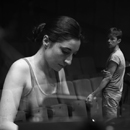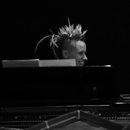Programme
12
2017
THU
Museum of the History of Polish Jews POLIN
 "Stop the War!", "Struggle Song", "The Price of Oil", "Mayakovsky", "Johnny Has Gone for a
Soldier" - the
very titles of many of Frederic Rzewski’s pieces give witness to the composer’s political and
ideological engagement, as for the avant-garde artist born into a family of Polish immigrants music
tends to ally revolt and gesture of solidarity. It is no different in the case of the renowned "The
People United Will Never Be Defeated!" (1975), which draws from the Chilean working-class
protest
song "El pueblo unido jamás será vencido", uniting opponents of Augusto Pinochet’s
dictatorship, risen
to power by the 1973 military coup. Moreover, popularity of the song has reached far beyond Chile;
its tune (although the lyrics used to be modified) was heard during the Iranian "Green Revolution",
Tunesian "Arab Spring" at the Ukrainian Maidan or during rallies of the left-wing parties: the
Spanish
Podemos and the Greek Syriza.
"Stop the War!", "Struggle Song", "The Price of Oil", "Mayakovsky", "Johnny Has Gone for a
Soldier" - the
very titles of many of Frederic Rzewski’s pieces give witness to the composer’s political and
ideological engagement, as for the avant-garde artist born into a family of Polish immigrants music
tends to ally revolt and gesture of solidarity. It is no different in the case of the renowned "The
People United Will Never Be Defeated!" (1975), which draws from the Chilean working-class
protest
song "El pueblo unido jamás será vencido", uniting opponents of Augusto Pinochet’s
dictatorship, risen
to power by the 1973 military coup. Moreover, popularity of the song has reached far beyond Chile;
its tune (although the lyrics used to be modified) was heard during the Iranian "Green Revolution",
Tunesian "Arab Spring" at the Ukrainian Maidan or during rallies of the left-wing parties: the
Spanish
Podemos and the Greek Syriza.
"The People United Will Never Be Defeated!" by Frederic Rzewski was composed as a set of 36
variations since, according to the artist, "Variation perfectly expresses the idea of unity in
multiplicity". The composer’s artistic inspirations include, among other things, The
Rhapsody on a
Theme of Paganini, whereas references to the Romantic composers, including Tchaikovsky and
Brahms,
make this legendary avant-gardist and improviser particularly intriguing. This is because harshness
of the working-class song, musical abstraction and the Romantic pathos come together thus making
space for both emotions (also expressed by the pianists who are told to whistle or hit the
instruments) and reflexions.
We can see it for ourselves as Frederic Rzewski is one of the few composers who make their scores
and recordings available online.


 "My aim is to be fully myself. Fully black, fully gay" - Julius Eastman said
in an interview from
1976. These words, connecting simplicity and radicalism so characteristic of Eastman, could serve as
a motto for all his work. As the only Afro-American in the New York halls of minimalism, he brought
a breath of anarchy spiked with anger to the avant-garde movement – under his fingers the cold and
abstract music runs a fever. He would blow up the structure with improvisations, reached for rhythm
and harmony belonging to disco. "He used gestures representative of minimalism and was gradually
abandoning them to free ambient atmosphere" – composer David Borden wrote about Eastman’s
style.
Originality of this output comprises its politicalness expressed, for instance, in provocative
titles. Evil Nigger, coming from the late ‘70s, is part of a series including
"Nigger Faggot (NF)",
"Dirty Nigger" and "Crazy Nigger". Eastman had to justify himself for using the derogative f-word,
and
only years later were his linguistic activities sanctioned by rap.
"My aim is to be fully myself. Fully black, fully gay" - Julius Eastman said
in an interview from
1976. These words, connecting simplicity and radicalism so characteristic of Eastman, could serve as
a motto for all his work. As the only Afro-American in the New York halls of minimalism, he brought
a breath of anarchy spiked with anger to the avant-garde movement – under his fingers the cold and
abstract music runs a fever. He would blow up the structure with improvisations, reached for rhythm
and harmony belonging to disco. "He used gestures representative of minimalism and was gradually
abandoning them to free ambient atmosphere" – composer David Borden wrote about Eastman’s
style.
Originality of this output comprises its politicalness expressed, for instance, in provocative
titles. Evil Nigger, coming from the late ‘70s, is part of a series including
"Nigger Faggot (NF)",
"Dirty Nigger" and "Crazy Nigger". Eastman had to justify himself for using the derogative f-word,
and
only years later were his linguistic activities sanctioned by rap.
His uncompromising attitude didn’t facilitate his career development – at the beginning of the ‘80s
Julius Eastman was evicted from his East Village apartment together with all his belongings among
which were his compositions. Many of them ended up at the New York rubbish dump, and Eastman was
gone too. Addicted to drugs and alcohol he used to stay in the famous Tompkins Square Park. He died
homeless in Buffalo in 1990 at the age of 49.
Lutosławski Piano Duo, accompanied by Joanna Duda and Mischa Kozłowski, were the first to perform
his pieces. "Evil Nigger" and "Gay Guerilla" were released on "Unchained" album (2014, Bôłt
Records).
12
2017
FRI
Museum of the History of Polish Jews POLIN

 "Ksenofonia" was commissioned by Malta Festival Poznań where it was staged in 2016
as an open-air,
multimedia spectacle directed by Jan Komasa, with music composed by Bartek Wąsik and Miłosz Pękala
and choreography made by Mikołaj Mikołajczyk. It was seen by around ten thousand people gathered on
Mickiewicz Square. The Festival, along with the invited guests, thus commemorated the 60th
anniversary of Poznań June.
"Ksenofonia" was commissioned by Malta Festival Poznań where it was staged in 2016
as an open-air,
multimedia spectacle directed by Jan Komasa, with music composed by Bartek Wąsik and Miłosz Pękala
and choreography made by Mikołaj Mikołajczyk. It was seen by around ten thousand people gathered on
Mickiewicz Square. The Festival, along with the invited guests, thus commemorated the 60th
anniversary of Poznań June.
The concert in the POLIN Museum is going to be a chamber version of the Malta event, focused on
music and accompanied by VJ Wiktor Podgórski’s visuals.
The subject of the "last Polish uprising", as June ‘56 is sometimes referred to, was for Pękala and
Wąsik a pretext to compose a piece, whose leitmotif was rebellion of an individual and its
energy.
Strings (Royal String Quartet), percussion instruments and pianos (Kwadrofonik), analog synthesizers
and live electronic recall the background sound of the period (including fragments of Prime Minister
Cyrankiewicz’s speech). However, routine of the uniform life and monotonous work is giving way -
rebellion is sprouting inside. "Ksenofonia" contains both dramatic, fraught "crowd scenes" and
intimate
moments. It signals that each protest begins with "minority report": with little groups and
individuals taking the risk of objection.
Devoid of unambiguous references to the context of the Poznań events, the Wąsik and Pękala’s piece
unexpectedly increases in new meanings. And gains in relevance.
 Daniel Pearl, correspondent for "The Wall Street Journal", was assassinated in Pakistan on 1st of
February 2002. The perpetrators linked to Al-Qaida posted a video film of the brutal execution on
the Internet. "My name is Daniel Pearl" –the journalist said to the camera shortly before his
death,
and this very sentence can be heard in Daniel Variations. Steve Reich quotes the
words of King
Nebuchadnezzar from the biblical Book of Daniel: "Now in the second year of Nebuchadnezzar’s
reign,
Nebuchadnezzar had dreams; and his spirit was so troubled that his sleep left him" (New King
James
Version translation). "We are living in the times when terrifying dreams become reality." –
this is
how the composer explained his choice.
Daniel Pearl, correspondent for "The Wall Street Journal", was assassinated in Pakistan on 1st of
February 2002. The perpetrators linked to Al-Qaida posted a video film of the brutal execution on
the Internet. "My name is Daniel Pearl" –the journalist said to the camera shortly before his
death,
and this very sentence can be heard in Daniel Variations. Steve Reich quotes the
words of King
Nebuchadnezzar from the biblical Book of Daniel: "Now in the second year of Nebuchadnezzar’s
reign,
Nebuchadnezzar had dreams; and his spirit was so troubled that his sleep left him" (New King
James
Version translation). "We are living in the times when terrifying dreams become reality." –
this is
how the composer explained his choice.
"Daniel Variations" was created in 2006 as commissioned by Judea Pearl – Daniel’s father and
Barbican
Centre The piece arranged for four pianos, string quartet, two clarinets, six percussionists and
four singers creates musical space, in which the sombre biblical prophecy clashes with the
brightness emanating from the journalist’s name. Reich used to say in interviews that "In the
Jewish
tradition to give name to someone is to create his character. In photographs Daniel Pearl’s
personality seems to be beaming with light."
Repetitions – so characteristic of minimalism (and repeating the journalist’s words), in Daniel
Variations might be thus associated with lights of a lighthouse that keep returning at regular
intervals and breaking the darkness.
Choosing this form of homage was not accidental. Journalist Daniel Pearl was passionate about music,
which he treated as an important part of a cross-cultural dialogue. As Steve Reich puts it, Daniel
Variations is a tribute to the man, who "with all the beauty and grotesqueness of the situation
became a symbol of thousands of innocent victims who were killed while striving to do justice to all
parties."